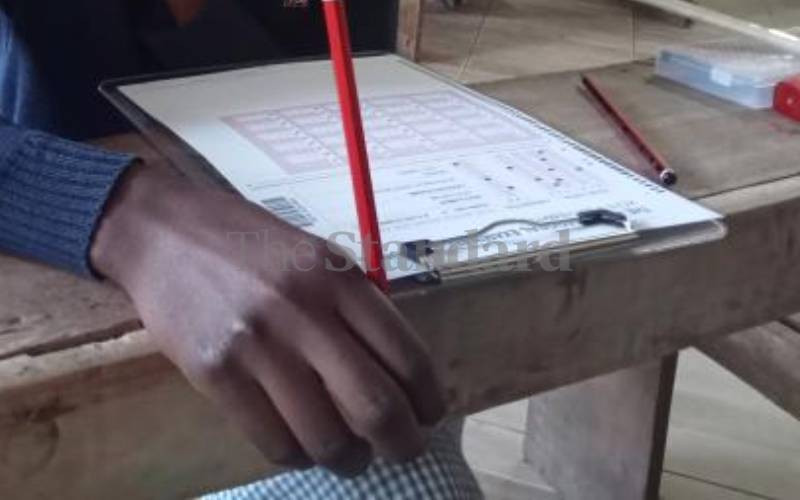The Kenyan law is tough on examinations irregularities; provide an examination paper to a candidate before the examination begins, and we either imprison you for 10 years or fine you up to Sh2 million.
Disclose the contents of an examination paper, and we imprison you for five years or fine you up to one million shillings. These are the stringent provisions of the Kenya National Examination Council’s (KNEC) Act, which became law on the October 19, 2012.
Despite this law, leakage of examinations has been on rapid increase. This raises a legitimate question; can criminalizing cheating, and guarding the examinations even more, curb examinations irregularities?
At least from our Kenyan experience, this seems inadequate. So, why do Kenya National Examination Council’s (KNEC) officers, teachers and parents collude to cause examinations irregularities, even when they know that they are breaking the law, and even causing a greater generational problem, passing on dishonesty and law-breaking attitudes to our children?
The answer to this question is one – the stakes are just too high. The Kenya Certificate of Primary Education and Kenya Certificate of Secondary Education examinations in Kenya have become a do-or-die situation.
Unless you pass Kenya Certificate of Primary Education, you will not join the best secondary schools in the country, or you may easily be part of the 250,000 candidates that may not proceed to any secondary school.
Unless you pass Kenya Certificate of Secondary Education, you may not join the University, and upon this transition, your future and fate will be determined.
Passing or failing examinations in Kenya is like missing the password to successful living. At least this is how Kenyans perceive it.
Our children are sleeping for an average of three hours a night; others spend four hours every day traveling from home to the other end of Nairobi to access that school they believe passes exams better. The mean score is the password, and Kenyans are going to all extents to get it right.
To address this issue, the proposed curriculum reform has made four recommendations. First, the final examinations should not determine everything.
Rather, we have a system of continuous (or formative) assessments, which also contribute to the final score. Second, the examination at the end of primary should not determine whether one goes to secondary school or doesn’t.
Third, we should have children examined in different things, depending on their interests, potential and talents; at least at the end of secondary school. Lastly, examinations should not just focus on what the candidate knows and their ability to repeat it, but rather, what they can do, or the competences they possess.
If implemented, we find these proposals spot-on. To curb irregularity, we must restructure the way we examine, and rethink the reason for which we examine. Having a three-day examination judge your eight years is rather tragic.
Some children fall sick; others get too scared by the examination, or from merely seeing armed policemen walking around. Complementing the three-day encounter with some more comprehensive assessment of your potential over the years is important. In any case, the final examination does not help the candidates improve themselves, it just judges them.
We should also not examine just to sort children into better and worse schools, or University. Assessments must serve their rightful or criterion purpose of giving feedback to the curriculum, while also helping children to learn better.
Stay informed. Subscribe to our newsletter
In this case, assessing competences rather than just content is important. For instance, the Uwezo learning assessment checks whether a child can actually read and comprehend, rather than just whether they know the grammar.
Expanding secondary schools to accommodate all children completing primary school will also ease the pressure. At the same time, having equitable quality in all secondary schools is instrumental.
The government should focus on the low-quality secondary schools, funding them more and visiting them more to improve quality. Ironically, the good schools are the ones receiving more money, and receiving most visits by the quality officers.
We think that these system-wide reforms will help curb examinations cheating, more than the imprisonment and the fines.
 The Standard Group Plc is a
multi-media organization with investments in media platforms spanning newspaper
print operations, television, radio broadcasting, digital and online services. The
Standard Group is recognized as a leading multi-media house in Kenya with a key
influence in matters of national and international interest.
The Standard Group Plc is a
multi-media organization with investments in media platforms spanning newspaper
print operations, television, radio broadcasting, digital and online services. The
Standard Group is recognized as a leading multi-media house in Kenya with a key
influence in matters of national and international interest.
 The Standard Group Plc is a
multi-media organization with investments in media platforms spanning newspaper
print operations, television, radio broadcasting, digital and online services. The
Standard Group is recognized as a leading multi-media house in Kenya with a key
influence in matters of national and international interest.
The Standard Group Plc is a
multi-media organization with investments in media platforms spanning newspaper
print operations, television, radio broadcasting, digital and online services. The
Standard Group is recognized as a leading multi-media house in Kenya with a key
influence in matters of national and international interest.








